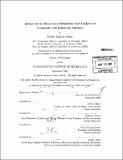| dc.contributor.advisor | Glenn Ellison, Whitney Newey and Victor Chernozhukov. | en_US |
| dc.contributor.author | Cohen, Moshe Aharon | en_US |
| dc.contributor.other | Massachusetts Institute of Technology. Dept. of Economics. | en_US |
| dc.date.accessioned | 2010-04-28T17:13:29Z | |
| dc.date.available | 2010-04-28T17:13:29Z | |
| dc.date.copyright | 2009 | en_US |
| dc.date.issued | 2009 | en_US |
| dc.identifier.uri | http://hdl.handle.net/1721.1/54640 | |
| dc.description | Thesis (Ph. D.)--Massachusetts Institute of Technology, Dept. of Economics, 2009. | en_US |
| dc.description | Cataloged from PDF version of thesis. | en_US |
| dc.description | Includes bibliographical references. | en_US |
| dc.description.abstract | The three chapters which comprise my thesis are a collection of essays on the analysis of the corporate governance and airline markets and of the federal appellate structure. In Chapter 1, I use a discrete choice framework to analyze state design and firm choice of the implications of incorporation: corporate governance laws, corporate taxes and court structure. Firms - differentiated on ownership, management, industry concentration, financial profile and unobservable dimensions - freely choose their preferred state of incorporation or reincorporation. The revealed preference embedded in this observable choice is used as window into the heterogeneous preferences within and across firms, yielding several findings: For example, I find, surprisingly, that firms are very responsive to incorporation and franchise taxes. In addition, on average, firms like anti takeover statutes, but, consistent with an agency story, firms with an institutional shareholder block and venture capital backed firms dislike them. On average, firms dislike mandatory governance statutes restricting managerial power and facilitating the representation of minority shareholders, but these laws are less restrictive for the choice of firms in concentrated industries. All firms dislike well functioning courts, consistent with a litigation deterrence motive. The recovered firm preferences are then taken to the simulation of recently proposed federal reforms aimed at centralizing the domicile implications and restricting firm choice. | en_US |
| dc.description.abstract | (cont.) They are also related to the documented differential returns earned by firms with better internal governance in the 1990s, as well as to other (new) trading strategies that would have yielded abnormal returns in the 2000s. Chapter 2 begins with the observation that airlines choose the domestic markets - city pairs - they serve and the prices they charge given the structure of their network and the networks of rival airlines. I cast this choice into a dynamic oligopoly entry game to recover airline fixed and variable operating costs, entry costs, and profits, using a panel of 20 quarters of DB1B and T-100 Domestic Segment Data. These estimates are then used to analyze the strategic and cost saving effects of hubs, and LCC. I find that hubs are valuable to consumers and increase the variable profits of the hubbing airline, but when including fixed costs their desirability is much less clear. LCC, and especially Southwest and JetBlue are especially attractive to consumers, have lower marginal costs and have a strong negative impact on the profits of the incumbents in the markets they serve. In Chapter 3, using data on all federal civil trial and appellate cases from 1992-2003, I show that appeals are generally rejected and, for some case categories, can have negative expected net present value. Appellate outcomes can be further related to the trial decision being by judge or jury, the identity of the prevailing party (plaintiff or defendant, US or private), and the form of representation. Some of these factors influence the propensity to appeal, however, others, including whether trial was by judge or jury, go in the opposite way. | en_US |
| dc.description.abstract | (cont.) I discuss the implications of these findings for the modeling of the incentives to appeal and settlement breakdown, and for appellate reform. | en_US |
| dc.description.statementofresponsibility | by Moshe Aharon Cohen. | en_US |
| dc.format.extent | 209 p. | en_US |
| dc.language.iso | eng | en_US |
| dc.publisher | Massachusetts Institute of Technology | en_US |
| dc.rights | M.I.T. theses are protected by
copyright. They may be viewed from this source for any purpose, but
reproduction or distribution in any format is prohibited without written
permission. See provided URL for inquiries about permission. | en_US |
| dc.rights.uri | http://dspace.mit.edu/handle/1721.1/7582 | en_US |
| dc.subject | Economics. | en_US |
| dc.title | Essays on the structural estimation and analysis of corporate and industrial markets | en_US |
| dc.type | Thesis | en_US |
| dc.description.degree | Ph.D. | en_US |
| dc.contributor.department | Massachusetts Institute of Technology. Department of Economics | |
| dc.identifier.oclc | 605074750 | en_US |

